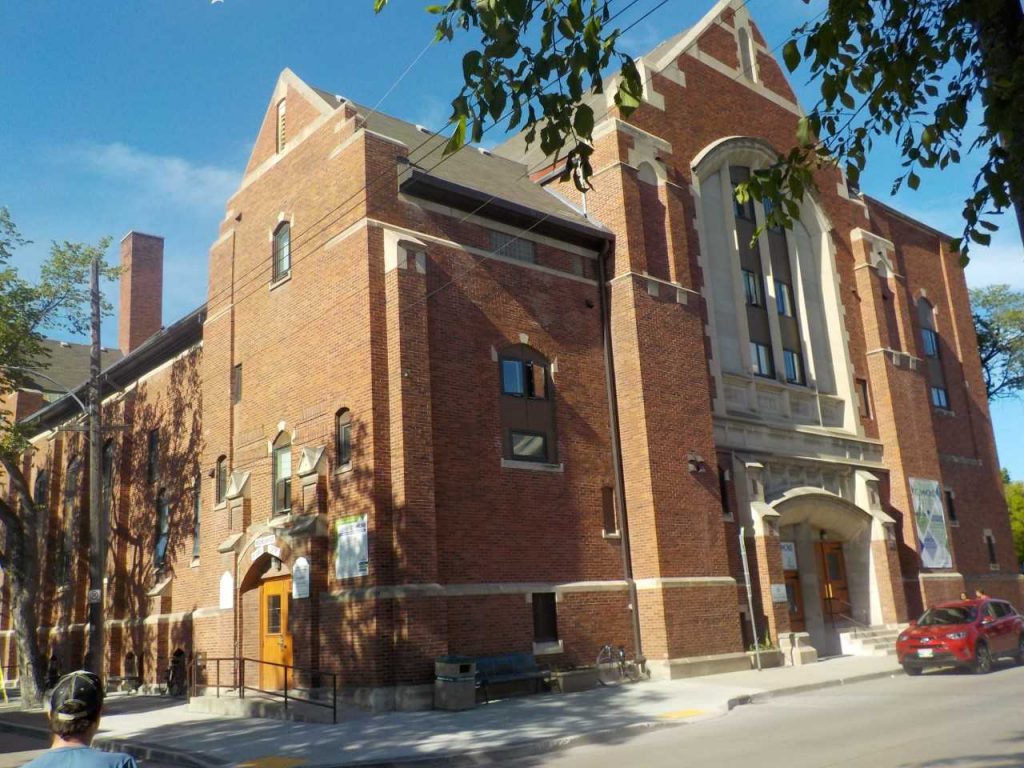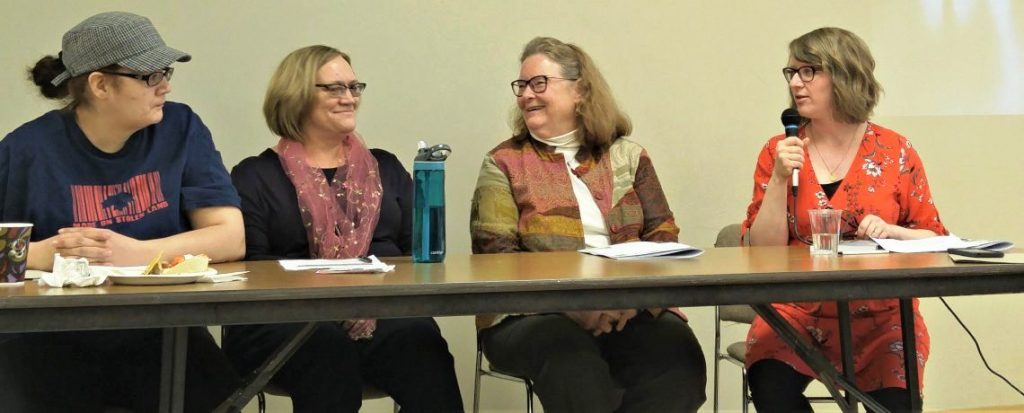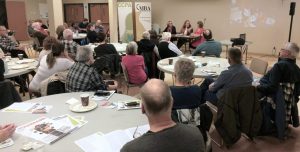This guest blog is written by Genny Funk-Unrau, Klinic’s Community Health Outreach Worker
I have heard my position being called as Klinic’s gift to the community. My position is Klinic’s Community Health Outreach Worker and much of my work over the past 17 years has been offering my time and skills to projects and organizations in our Health Services catchment area. As I work from a Community Development approach with a Social Determinants of Health lens I tend to respond to community requests and needs and stay with a project until there is community capacity to take on my roles and tasks.

One such project has been the development of the WestEnd Commons, the building formerly known as St. Matthews Anglican Church. The church had a dwindling congregation and an increasing maintenance to-do list; so, they decided, after much discussion, to turn most of their sanctuary into social housing. In 2009, the St. Matthews Non Profit Housing, Inc. (SMNPH) was created as a partnership of St. Matthews Anglican Church and the Grain of Wheat Church-Community and soon after architect drawings were developed, money for capital raised and construction of housing started.
Much of my work has been to help create the sense of community in West Central Winnipeg. In October 2010, I was asked to join one of the SMNPH board committees, the Community Life Committee, which would look at the “tenant life” in the WestEnd Commons. This committee envisioned bringing in tenants who needed safe, stable housing and reflected the local community. This included Indigenous and Newcomer families, families who needed good housing so they could be reunified and families with someone coping with a mental health issue. We wanted the housing to be a supportive place so families dealing with trauma histories could find a safe place to heal and grow. We knew it would be through using a community development approach of neighbours helping neighbours that this project would be successful. My work was to take these goals and become the social architect for the WestEnd Commons.
As we envisioned this social support model, we knew we would need a staff position to help us put it into practice. The Community Connector job description was developed with the goal for that position being to connect tenants with one another and to connect them with resources in the local and broader community. For us to have this kind of position fundraising was needed; I was able to spend my work time writing funding proposals and eventually funding reports. This included helping to develop the framework for this position maintaining our theory that providing support along with social housing would not only benefit the families but also the broader community. We were successful with the grant writing and the first Community Connector was hired in August 2014.
While the construction of the housing was taking place, the Community Life Committee was also looking at the life of the Neighbourhood Resource Centre (NRC) in the lower level of the building. This space has been a community resource for over 40 years. Previously the priest of the church would be responsible for the rentals but now the SMNPH board was responsible for the space and didn’t have staff to oversee it. So again, I spent some time writing funding proposals, helped to create a job description and an “Organizational Developer” was hired as a temporary position to help create policies and procedures for the space.
During this time I also took on the leadership of creating a new board committee, the Neighbourhood Resource Centre Social Enterprise Committee, which set up the NRC as a social enterprise with space being its commodity. It provides directions for the NRC space which includes offices, meeting rooms and a commercial kitchen for rent. A NRC Manager position was created to manage the rentals so revenue was created, allowing the NRC to be self-sustaining.
I joined the SMNPH board as a community member in October 2014. The WestEnd Commons is a huge project as it is a large building with many different pieces. My role at the WEC includes tasks most Executive Directors of a small organization would normally do. Since there is no funding for an Executive Director at the WestEnd Commons, Klinic has gifted the organization with my time. Besides helping with the grant writing and reporting, I support and supervise the staff, help set up recording and accountability procedures for the staff and, along with staff, I connect with residential and NRC tenants so their concerns can be brought to the board. I also chair the board’s Neighbourhood Resource Centre Social Enterprise Committee and help create and bring to life its vision and mission of being a resource to the community. This includes helping with creating annual goals, marketing plans, supporting the NRC Manager and tasks such as creating NRC tenant leases. I also spend a lot of time with the board and committees trying to help them keep to the WEC vision of creating a place of hope, joy and strength.

Panel discussion the WestEnd Commons Model of Subsidized Housing with Supports. Panel includes Sonia Cashman, WestEnd Common’s tenant, Genny Funk-Unrau, St. Matthews Non Profit Housing board member and Klinic Community Health Outreach Worker, Cathy Campbell, former priest of St. Matthews Anglican Church, Jess Klassen, CCPA – author of report
In November 2014, the first residential tenants moved into the WestEnd Commons. The Community Life Committee felt it was important to document and track the actual practice of supporting tenants so we could share this model. We partnered with the Canadian Centre for Policy Alternatives to do a 3- year study of the impact of social housing with support on the WEC families. Families were interviewed up to 3 times over the 3 years. The final report was released on March 1, 2018 sharing the results of the WEC model of social housing with supports. At the launch celebration I was part of a panel discussion giving background to this report. This study and report by Jess Klassen provides many examples of not only providing social housing but also, social supports. have positively impacted families. Despite the successes shown in this report the biggest challenge to come is sustaining the funding for the Community Connector position.
The report also speaks to the growth and strengths of the tenants since being at the WEC. As Klassen states in her Lessons from the WestEnd Commons, “Of the households involved in the three-year research project, sixty-one percent achieved gains in employment, fifty percent furthered their education, and twenty-eight percent stopped receiving social assistance during their tenancy at the WestEnd Commons. ….Over the past three years the residents at the WestEnd Commons have experienced improved housing stability, stronger social networks, reduced isolation, improved mental health, increased food security, stronger labour market attachments, and greater financial stability due to subsidized rents with supports.”.
You can read the full report “Here We’re At Home” https://www.policyalternatives.ca/sites/default/files/uploads/publications/Manitoba%20Office/2018/03/WestEnd%20Commons_JKlassen.pdf or check out the its summary Subsidized Housing With Support Needs More Support: Lessons from WestEnd Commons https://www.policyalternatives.ca/publications/commentary/subsidized-housing-supports-needs-more-support
Following a Community Development approach I will continue to support and mentor staff as they take on additional responsibilities and encourage board and committee members in taking on some of my roles as I gradually step back. Once the organization has the capacity to do these roles on their own, then it will be time to leave this project and see where the community takes me next.



